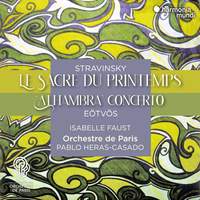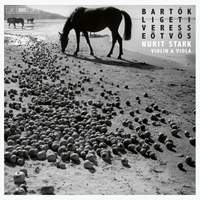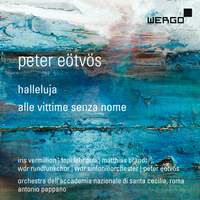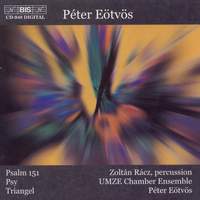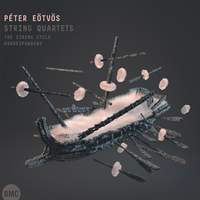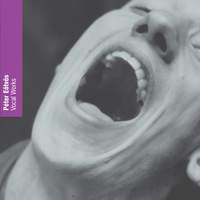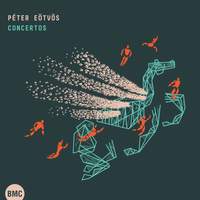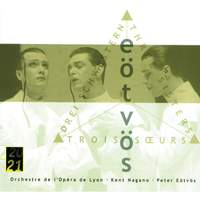Obituary,
Péter Eötvös (1944-2024)

The Hungarian composer and conductor Péter Eötvös has died at the age of 80.
Born in what is now Odorheiu Secuiesc, Romania, Eötvös felt all his life that the multicultural blend of the Transylvania region was a crucial influence on him - although he drew extensively on his Hungarian identity (his hometown, contested between Hungary and Romania for centuries, had been part of the former when he was born and his family was of Hungarian origin), a resistance to narrow nationalism remained a lifelong touchstone value for him. The Hungarian label BMC Records was, and remains, particularly active in championing his music, and many of his works have received their premiere or only recording on BMC.
Eötvös’s upbringing was enviably musical - his mother was a pianist and ensured that he heard many musical performances in Budapest. His talent showed itself early and by his mid-teens he was accompanying films at the piano and organ, leading fairly directly to commissions for new film and stage music. It was inevitable that sooner or later he would begin to attract attention in the artistic world; György Ligeti quickly became aware of his precocious talent and recommended him to Zoltán Kodály at the Budapest Academy of Music (now the Franz Liszt Academy of Music).
His earliest compositions reflect Hungarian-ness strongly - drawing on the country’s folk-tales and building on his study of Bartók and Kodály, as well as what he considered to be uniquely Hungarian approaches by conductors such as George Szell and Ferenc Fricsay. Like many composers of his time living under Communist governments that restricted the media, he also covertly encountered contemporary Western music and jazz via the radio. Indeed, it was not long before he travelled to the West in person, taking up a scholarship to study with Zimmermann in West Germany in the 1970s. While there he worked at the Cologne Opera, with the Stockhausen Ensemble and for the broadcaster Westdeutscher Rundfunk, in a role that saw him working regularly with electronics and furthered his existing interest in fusing them with classical music.
It was not initially obvious that Eötvös would achieve fame as a composer; initially he excelled rather as a conductor (under the mentorship of Boulez, whose Ensemble InterContemporain he led for over a decade), developing a collaborative style of work that paid dividends in the complex contemporary music he worked on. Recordings he made as a conductor have won great acclaim over the years, in particular his 2004 recording of Berio’s Sinfonia with London Voices. Still, composition began to play a more prominent role over the years; a recurring fascination with space and the cosmos is apparent in his work, with his Op. 1 Kosmos a direct response to the flight of Yuri Gagarin in 1961, and other works over the years dedicated to the same theme - including Seven, a 2006 work in memory of the astronauts killed in the Columbia Shuttle disaster, and Multiversum from 2017, the latter featuring a prominent part for the Hammond organ that had been such a feature of his early career.
His style defies easy categorisation - enthusiastically incorporating electronic and synthesized sounds into his complex timbres, making use of dodecaphonic elements though also embracing lyrical tonality at times, and occasionally engaging in wry, winking-at-the-audience irony. His percussion concerto Speaking Drums is particularly irreverent and features nonsense-vocalisations as well as extended percussion techniques per se from the soloist, whose role is wildly extroverted, highly theatrical and calls on them to interact with members of the orchestra in unorthodox ways. A 2016 performance from the Frankfurt Radio Symphony Orchestra with soloist Martin Grubinger saw frying pans and road signs incorporated into the percussion section!
In addition to influences from his native Hungary, Eötvös’s music reflects his interests in a wide range of musical traditions from around the world - Japan (seen in his first operatic composition Harakiri, based on the suicide by seppuku of the Japanese nationalist poet Yukio Mishima in 1970), Russia (in the Chekhov-based Tri Sestry), the Basque country (reflected in The Gliding of the Eagle in the Skies) and both Spanish and Arabian music in the Alhambra Concerto. His interest in jazz likewise surfaces from time to time, above all in the trumpet concerto Jet Stream.
This sense of avid cosmopolitanism perhaps sums up Eötvös as a composer - although always proud of, and in touch with, his Hungarian heritage, he was constantly looking outward to other cultures and influences, and was not afraid to confront related political questions head-on; his ‘music theatre’ work Der Goldene Drache in particular deals with the struggles and mistreatment of migrants, ranging from gallows humour via surrealism to an almost Brechtian sense of oppressive hopelessness.
Given this decidedly ‘citizen of the world’ outlook, it’s no coincidence that Eötvös (having lived in France, Germany and the Netherlands for many years) returned to his home country and established a foundation for contemporary music there in 2004, the year that Hungary joined the European Union.
Péter Eötvös’s death following a long illness was announced by his family on Sunday 24th March.
"Individuals are shaped by all forms of culture, and I would be happy if at the end of my life I had the feeling that I had allowed the world to pass through me, and that something had been retained within me, like in a sieve." ~ Peter Eötvös
A selection of recordings of Eötvös's music
Patricia Kopatchinskaja (violin), Frankfurt Radio Symphony Orchestra, Ensemble Modern, Péter Eötvös
Available Formats: MP3, FLAC
Isabelle Faust (violin), Orchestre de Paris, Pablo Heras-Casado
Available Formats: CD, MP3, FLAC, Hi-Res FLAC
Nurit Stark (violin and viola)
Available Formats: SACD, MP3, FLAC, Hi-Res FLAC
Matthias Brandt, Topi Lehtipuu, Iris Vermillion, Antonio Pappano, Péter Eötvös
Available Formats: CD, MP3, FLAC
Gergely Ittzés (flute), Zoltán Rácz (marimba & percussion), Miklós Perényi (cello), UMZE Chamber Ensemble, Budapest, Péter Eötvös
Available Formats: CD, MP3, FLAC
Calder Quartet
Available Formats: MP3, FLAC
Wojtek Drabowicz (baritone), Piroska Molnár (voice), SWR Symphony Orchestra, Baden-Baden, Tokk Ensemble, Tomkins Vocal Ensemble Budapest, Péter Eötvös
Available Formats: MP3, FLAC
Akiko Suwanai (violin), Richard Hosford (clarinet), John Bradbury (clarinet), Pierre-Laurent Aimard (piano), Gothenburg Symphony Orchestra, BBC Symphony Orchestra, Péter Eötvös
Available Formats: MP3, FLAC
Frankfurt Radio Symphony Orchestra, Håkan Hardenberger (trumpet), Péter Eötvös
Available Formats: MP3, FLAC
Orchestre de l'Opéra national de Lyon, Kent Nagano
Available Formats: MP3, FLAC
Hungarian Radio Symphonic Orchestra, Gregory Vajda
Available Formats: MP3, FLAC



